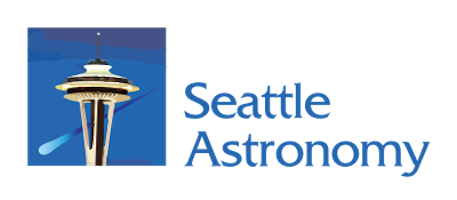After a year and a half of COVID quarantine that has limited personal contact of most sorts, including astronomy events, there's some evidence that northwest astronomy clubs are at least considering the notion of holding events at which humans gather together to look at the cool stuff in the sky.
 |
| Will astronomy events soon resume at the UW and other venues? Theodor Jacobsen Observatory photo by Greg Scheiderer. |
Now comes word that at least one club is calling its members back together. An email from the Everett Astronomical Society announces that it will hold an in-person meeting at 3 p.m. this Saturday, August 21, at the Evergreen Branch of the Everett Public Library. This has been their meeting spot for some years, and it's finally opening back up. The club has set its monthly meetings for the third Saturday of the month at least through the end of the year.
There will be some limitations. The email notes that, "With the highly-infectious COVID delta variant still circulating, we ask that attendees be vaccinated, or masked, or ideally both." It notes that they'll keep some spacing between seating, and adhere to any masking and other requirements that the library may establish.
Will other clubs follow suit?
The Seattle club may not be far behind. A notice for its scheduled online meeting next Wednesday, August 25, explains that, "We have a (sic) tentative plans for resuming in-person monthly gatherings in September pending regulations and safety." The SAS typically meets in the physics/astronomy auditorium of the UW in Seattle.
The Tacoma Astronomical Society also meets at a college but has not yet considered starting in-person gatherings, though there's hope the club can resume its popular public nights in late fall. The society is also providing telescopes for viewing for attendees of the "Jazz Under the Stars" concert series at Pacific Lutheran University.
Many other astronomy clubs are incommunicado on the subject. We found many in the area that have not done updates to their websites or Facebook pages since March 2020.
Astro material
Regular readers of this blog may have noted that we haven't published much in the last year and a half. Astronomy events have been a big part of what we've covered, and there just haven't been many. That dearth continues. The Museum of Flight is open for regular hours but many of its events remain online. The Pacific Science Center in Seattle and OMSI in Portland are also open only on a limited basis. Astronomy on Tap Seattle, since 2015 a reliable source for a monthly lecture or two, hasn't had an in-person event since February 2020. While they've held numerous online events in partnership with the UW Institute for Data Intensive Research in Astrophysics and Cosmology (DiRAC), it's just not the same without the beer. Town Hall Seattle is ramping up its schedule of lectures, but most of them at present remain online only. All of these have been great sources of live events that we've been happy to attend and share with you.
The wild card in all of this is the delta variant of the COVID virus and the recent surge in COVID cases and hospitalizations. Some guidelines around masking and gathering have already been made more restrictive, and there's some considerable possibility that the virus could force astronomy club activity to resume later rather than soon.


